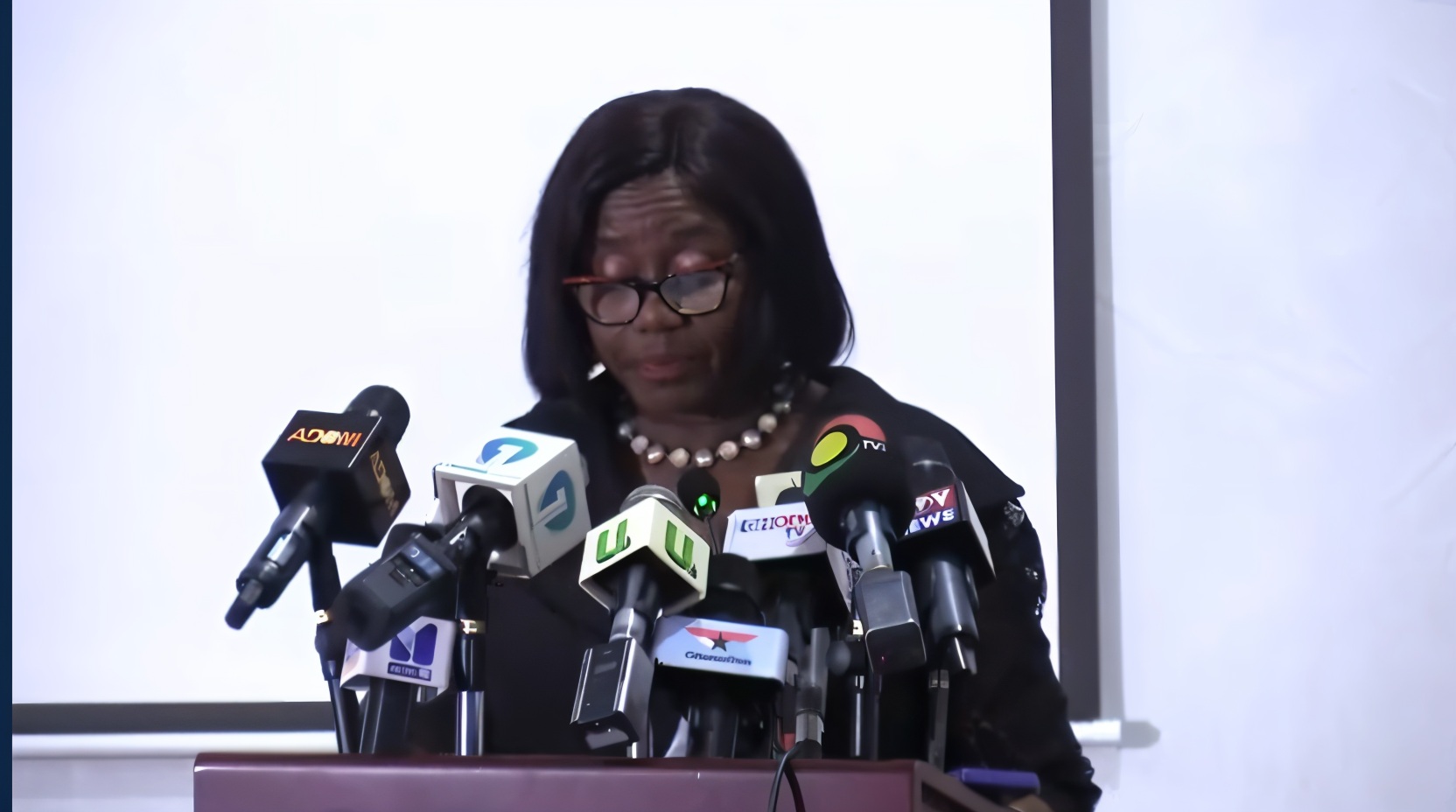“I Will Not Resign”: Chief Justice Torkornoo Defends Integrity, Slams Removal Process in Fiery Press Conference

Accra, Ghana – June 25, 2025 Suspended Chief Justice Gertrude Araba Esaaba Sackey Torkornoo delivered a bold and emotionally charged address today at the Palms by Eagles Airport City, firmly rejecting calls for her resignation and decrying the Article 146 removal process as “flawed, opaque, and unconstitutional.”
This was her first public appearance since her suspension on April 22, 2025—an event that has since spiralled into one of the most consequential constitutional controversies in Ghana’s democratic history.
A Historic First And a Constitutional Crisis
The Chief Justice began by underscoring the unprecedented nature of her situation: “In all of Ghana’s 68-year history as an independent republic, there has never been a hearing for the removal of a Chief Justice,” she said. “One would have hoped that such a process would serve as a model for transparency and legality. Instead, it has become a cautionary tale.”
The Article 146 Committee on the Removal of the Chief Justice, chaired by Supreme Court Justice Gabriel Scott Pwamang, is tasked with investigating three petitions filed on February 14 and March 17, alleging misconduct. Justice Torkornoo accused the committee of denying her access to the full content of the petitions and blocking her legal counsel from engaging meaningfully in the proceedings. She also criticized the decision to allow petitioners to submit testimony in absentia.
“Every Step Breaks Every Rule”
She described the hearing process as one that “breaks every rule on how justice is delivered,” emphasizing that she had not been provided with crucial documents, including the prima facie determination by the President, documents that any respondent under due process would ordinarily receive.
Justice Torkornoo also expressed alarm over the choice of Adu Lodge, near Osu Castle, as the hearing venue, a site historically linked to the 1981 abduction and murder of judges, including her uncle, Major Sam Acquah. “That location is not just symbolic; it is chilling,” she said.
Allegations of Bias and Conflict of Interest
The Chief Justice cast doubt on the neutrality of the committee, citing Justice Pwamang’s prior rulings involving one of the petitioners, Daniel Ofori, as a potential conflict of interest. She also questioned the committee’s authority to issue subpoenas, calling its procedural footing “legally unanchored.”
She firmly rebutted the substance of the allegations, ranging from travel expenses to judicial decisions, as “baseless” and “not remotely true,” providing documentation to support her defence.
Supreme Court Rebuff and Human Rights Concerns
Justice Torkornoo revealed that her request for a public hearing had been dismissed by the Supreme Court, which also struck out her supplementary affidavit outlining alleged human rights violations. These included being searched, denied full access to her legal team, and barred from entering the hearing room with her spouse and children. She argued that the secrecy surrounding the proceedings was being used to obscure injustice.
Judicial Independence Under Threat
Perhaps the most sobering segment of her address came when she warned that her treatment sets a dangerous precedent for Ghana’s judiciary. “If this model can be tried on the Chief Justice, it can be repeated with everyone,” she said.
Justice Torkornoo emphasized that the framers of Ghana’s 1992 Constitution deliberately shielded judges and independent officeholders, such as the Auditor-General, Electoral Commission, and CHRAJ, from political retaliation through Article 146 protections. “This process will affect how all High Court Justices, Justices of the Court of Appeal, Supreme Court Justices, and all Chief Justices that will be appointed in the future may be removed from office,” she cautioned.
Her assertions were reinforced by the Ghana Bar Association (GBA), which issued a formal press statement on April 24, 2025, following its General Council’s review of the unfolding events. The GBA described the suspension as constitutionally problematic and urged all actors to adhere strictly to the rule of law and Article 296, which governs the exercise of discretionary power. The Association emphasized that the matter was sub judice and called for restraint, transparency, and fidelity to constitutional safeguards. It pledged to remain “the conscience of society and the voice of the voiceless.”
No Resignation, No Retreat
With resolve, the Chief Justice made it clear that she would not step down. “Resigning is not an option—it would mean accepting this flawed system,” she declared. Citing the Supreme Court’s own ruling in Suit No. J6/02/2019, she explained that a judge cannot legally resign while Article 146 proceedings are underway.
“To walk away now would be to surrender to injustice and lose everything I’ve worked for, not just my position, but my integrity,” she said.
She warned that capitulation would pave the way for coordinated removals of public officers based on untested allegations: “If false claims are made against a judge or commissioner just to achieve a political agenda, the solution cannot be to resign out of frustration or fear.”
Government Response: “No Political Agenda”
In a swift rebuttal, Presidential Spokesperson Felix Kwakye Ofosu defended President John Mahama’s actions as constitutionally grounded. He dismissed suggestions of political interference and stressed that the hearing venue was chosen for its logistical convenience, not as a form of intimidation. “No political agenda exists,” he said. He further alleged that the first leak in the case originated from the Chief Justice’s correspondence.
A Nation Watching
The press conference was broadcast live and covered extensively across traditional and digital media platforms. While some commentators praised the Chief Justice’s courage and articulation, others questioned whether her tone could complicate the legal process.
What Comes Next?
The Article 146 Committee on the Removal of the Chief Justice—comprising Justice Gabriel Scott Pwamang (Chair), Justice Samuel Kwame Adibu-Asiedu, former Auditor-General Daniel Yaw Domelevo, Major Flora Bazuwaaruah Dalugo (Rtd), and Professor James Sefah Dziasah is expected to resume its in-camera hearings in the coming days.
Justice Torkornoo’s legal team may pursue further legal redress, including seeking a stay of proceedings or challenging the committee’s scope and independence. The Ghana Bar Association’s intervention has added institutional weight to calls for transparency and reform, while civil society organizations like CDD-Ghana are reportedly preparing legal analyses to assess the broader constitutional implications.
Once the committee completes its report, it will be submitted to President Mahama, who must then decide whether to act on its recommendation—either by removing Justice Torkornoo from office or reinstating her. Legal experts suggest that either outcome may be challenged in court, potentially setting the stage for a defining constitutional showdown.
Until then, the Chief Justice remains suspended but far from silent. “This is not just about me,” she concluded. “It is about the soul of our judiciary and the future of our democracy.”



0 Comments
No comments yet, be the first to comment